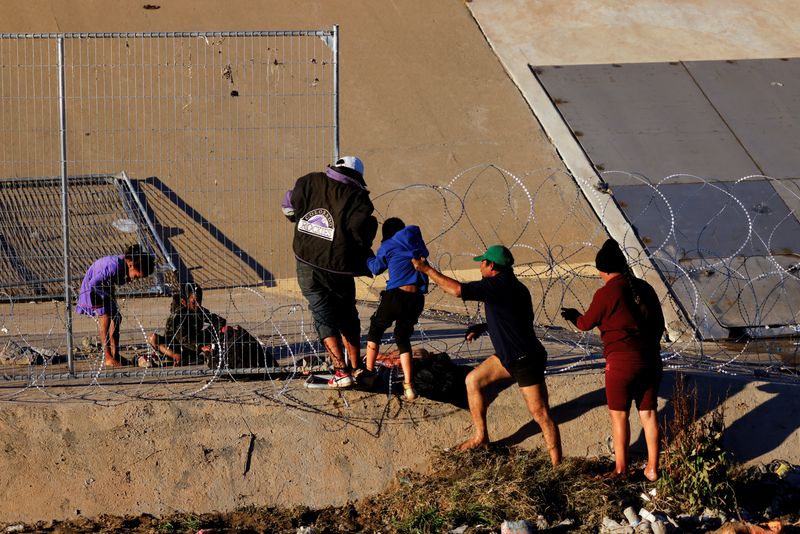By Mica Rosenberg
(Reuters) - U.S. President Joe Biden is visiting the U.S.-Mexico border for the first time since he took office in January 2021 on Sunday, ahead of a visit to Mexico and after announcing new measures to reduce border crossings.
What is happening at the U.S.-Mexico border now and why are there record numbers of crossings?
WHO IS TRYING TO ENTER THE UNITED STATES AT THE BORDER?
U.S. Border Patrol made more than 2.2 million arrests at the U.S.-Mexico in the 2022 fiscal year, which ended last September, the most ever recorded.
But many of those were individual migrants who tried to cross multiple times after being caught and rapidly expelled back to Mexico under a COVID-era order known as Title 42.
The policy was implemented in March 2020 under Republican former President Donald Trump, an immigration hardliner. Biden, a Democrat, tried to end the Title 42 order, which health officials said was no longer needed, but the termination was blocked in court.
Before last year, Mexico had generally only been accepting expulsions of its own citizens along with migrants from the Central American countries of Guatemala, Honduras and El Salvador. The number of Venezuelans crossing the border plummeted after Mexico agreed to accept expulsions of Venezuelan migrants last October.
Biden announced on Thursday that Cubans, Haitians and Nicaraguans - who have also been arriving in larger numbers - will now also be expelled under Title 42.
WHY ARE PEOPLE CROSSING?
Before Title 42, migrants had been allowed to approach a U.S. port of entry and tell border officials they feared returning to their home country, which sets in motion the asylum process.
Migrants looking for protection must prove they have been persecuted, or fear they will be, on the basis of their race, religion, nationality, political opinion or membership in a particular social group to a U.S. asylum officer or in U.S. immigration court.
Migrants who have arrived on U.S. soil are eligible to ask for asylum, even if they cross the border illegally and turn themselves into border agents, but winning a case is a long and complicated process that can take years due to backlogs.
The Biden administration has said it wants to surge resources to process more claims quicker but faces budgetary and other constraints.
The administration in its announcement Thursday also said it would expand its use of an app called CBP One that allows asylum seekers to enter their information as a pre-screening step to be given an appointment at a U.S. port.
WHAT HAPPENS TO PEOPLE AFTER THEY CROSS?
Migrants who cannot be expelled under Title 42 are processed under an immigration statute known as Title 8 and can be detained or released into the United States while their immigration cases are pending.
Asylum seekers are eligible to apply for work permits as long as they attend court hearings and other immigration check ins. Some are obligated to comply with electronic monitoring, like ankle bracelets. If they miss their hearings or lose their cases they are at risk of deportation.
The Republican governors of Texas and Arizona last year bused thousands of migrants from the border to northern cities like New York and Washington, D.C., which they say eases the pressure in border communities and sends a political message to Biden and Democrats. The city of El Paso also ran its own busing campaign, but has stopped.
WHY CAN'T MORE PEOPLE ENTER LEGALLY IN THE U.S.?
As part of Biden's announcement on Thursday, the administration said it would admit up to 30,000 migrants by air from Cuba, Haiti, Nicaragua and Venezuela each month under a new temporary "humanitarian parole" program if they have a U.S. sponsor.
There are a number of ways to enter the United States legally as an immigrant, including being sponsored by a U.S. citizen or company, or to perform a particular job or to study. But obtaining a visa can be a long, expensive process that is not always accessible to the most vulnerable people.

The Biden administration also set a goal of resettling 125,000 refugees in 2022 who apply from abroad after Trump dramatically slashed admissions during his term. But delays from the COVID-pandemic have contributed to the U.S. falling way behind on that goal.
When Biden took office in 2021, he said he wanted Congress to pass comprehensive immigration reform. Such efforts to fix what many believe is a broken immigration system have been a long-standing goal of multiple administrations, but lawmakers have failed to come to any kind of consensus in recent years.